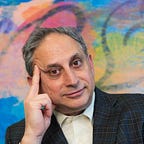So You Say You Want a Revolution?
One thing is clear from the results from this election cycle: The people are not happy. On both sides of the aisle, voters spurned the political elites and establishment in favor of populist candidates who recognize the deep fissures among America’s communities — especially young people.
Voters are responding to historically low levels of confidence in our governing institutions, raging culture wars, and a widening gulf between the haves and the have-nots. Youth unemployment is high — 12 percent in 2015 — and youth unemployment among minorities is staggering: Fifty percent of young blacks are unemployed or underemployed. Add in unattainable higher education, rising addiction rates and gun violence on epidemic proportions, and it is no surprise when despair and cynicism take root.
As a civil rights attorney and an architect of the NFL’s Rooney Rule, I have dedicated my professional life to equal opportunity, remedying discrimination, and holding accountable the powers that be. Now, although voters face one another from opposite precipices overlooking a chasm of unnecessary division based on race, religion and ethnicity, I am hopeful that the impetus for change will give birth to forward-looking solutions.
This week during National Volunteer Week, the time has come to seriously consider Universal Community Service for young people.
This week during National Volunteer Week, the time has come to seriously consider Universal Community Service for young people. As young people come together across the country over the next few days to participate in service projects to improve their communities it is evident that this extraordinary week of volunteering should continue in a more sustainable form.
Universal Community Service could strongly encourage and facilitate opportunities for people in their late teens and twenties to dedicate one to two years to serving their communities full-time, in a manner they choose. Participants might work at local fire stations, deliver green technologies, serve in the National Guard, or apprentice under teachers, serve as young doctors and lawyers in underserved areas. Governors would create a tailored menu of options for their states’ residents, to complement a federal roster of opportunities.
Universal Community Service would work to reduce yawning levels of inequality by equipping those with limited opportunities with the skills, experience and foundation to establish career paths. Service will empower the youth who undertake it, and instill a sense of dedication to our local and national communities. It will also harness young people’s desire to be part of building America’s future.
Imagine a corps of young people working closely together — rich and poor, white, black and brown, immigrant and non-immigrant alike — to install energy efficient windows for retirees, to expand the services of a domestic violence shelter, or to upgrade communication systems for first responders.
Imagine a corps of young people working closely together — rich and poor, white, black and brown, immigrant and non-immigrant alike — to install energy efficient windows for retirees, to expand the services of a domestic violence shelter, or to upgrade communication systems for first responders.Meeting challenges and working together will reduce the bias and prejudice that arises in our segregated communities. Common goals resulting in shared tangible successes will fight the despair plaguing so many of our communities — the despair that fuels drug dependence and violence, and which in turn begets disregard that results in crumbling infrastructure, failing schools, and tainted water.
Many, including President Obama, have lamented D.C.’s gridlock and polarization. Here is the truth: Overcoming our divisions will not occur in Washington. It will occur only if we unite as a country in a bottom-up effort to harness the hope and energy of our young people. Though our nation seems racked by division, let us not forget that this generation has shown itself to be by far the most inclusive in our history. Let us not waste this impulse or lose the opportunity to unite on a profound level.
Of course, some may be tempted to characterize this proposal as partisan. But private-public partnerships, spearheaded by state and local governments, which provide tailored programs to build up our infrastructure, enhance our competitiveness, and shape our citizens into civic leaders, should be an agenda item on both sides of the aisle.
I am not the first to envision a type of national service. Presidents Roosevelt, Kennedy, and Clinton laid the groundwork with the Youth Conservation Corps, the Peace Corps and Americorps, respectively. These ambitious programs harnessed the skills, talents and willingness of the young for the greater good. And in April of this year, Congresswoman Tammy Duckworth (IL-08) introduced the 21st Century American Service Act, legislation that transforms national service projects into equal-opportunity volunteer service projects for all young Americans who want to participate.
President Obama can be a part of this legacy. He can act now to establish a non-partisan task force on community service, which would study successful programs at home and abroad, and could provide a blueprint for our next president — whoever that may be — in providing the kind of grand, sweeping change that will reverberate for generations. The voters are begging for such change. Let us answer the call and move forward with Universal Community Service.
Cyrus Mehri is a civil rights attorney in Washington, D.C.
